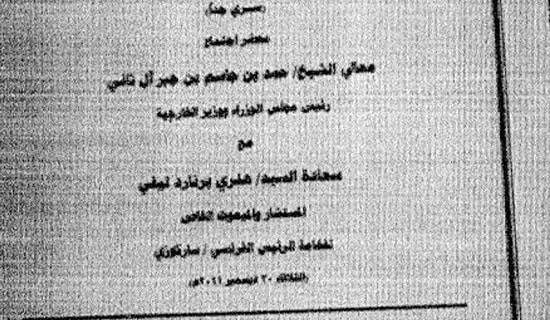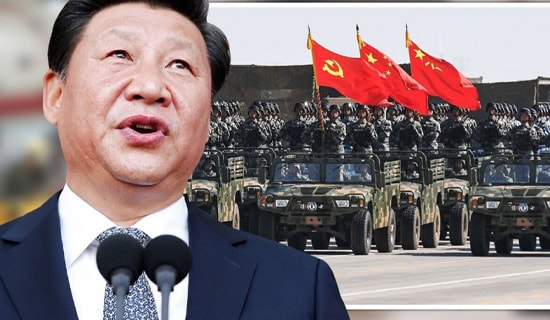The Palestinian media's gloating over Netanyahu's defeat in Israel's elections was soon replaced by discussions of Prime Minister-elect Ehud Barak's character and also the future of the peace negotiations. Barak's four 'Red Lines' that were announced following the elections[1] caused discontent in the Palestinian Authority and hostile reactions in the Palestinian press.
Hostile Towards Barak – Sympathetic to the Dovish Labor Leadership
Prime Minister-elect Barak is portrayed by the Palestinian media and leadership as tough and hawkish, and his 'Red Lines' have aroused personal antagonism. "While Netanyahu was better than his Likud comrades," claims PA Parliamentary Affairs Minister, Nabil 'Amru, "Barak is worse than his comrades in the Labor Party... ever since those Labor Party intellectuals hired him as a hawkish leader of doves, we haven't received any signs that he truly belonged in the Rabin-Peres school."[2] PA Ministry of Information Director-General, Hasan Al-Kashef, referring to Barak's military background, stated that his past will assist the PLO in negotiations over releasing Palestinian prisoners because Barak cannot use the argument, of "blood on the hands" of prisoners. He states, "Barak's biography includes foul deeds such as the murder and assassination of the leaders and martyrs in Beirut and Tunis. This bloody biography allows us to demand the immediate release of our prisoners and if Barak says that the hands of some of them 'are tainted with Israeli blood,' this statement will sound like bitter mockery coming from a General who takes pride in the blood of his Palestinian victims..."[3]
In contrast to the wide-spread conviction among the Israeli public that a broad-based government has a better chance to carry out significant political moves, PA senior officials would rather see a narrow government based on the political left and similar to the '92-'96 government." Anyone who even considers the inclusion of Ariel Sharon in this government does not understand the meaning of peace with the Palestinians," explains PA Cabinet General Secretary, Ahmad Abd Al-Rahman.[4] Nevertheless, the Palestinian leadership is aware that it is Barak rather than the dovish leadership of his party who will conduct the negotiations. PA Parliamentary Affairs Minister, Nabil 'Amru, criticizes "some Palestinians who attribute importance to the political atmosphere in which Barak will have to work[5]... However, Barak is expected to influence the people around him more than he is influenced by them. Let us wait and see how influenced General [Barak] will be by Peres' moralizing, Beilin's dreams, and Ben Ami's wisdom, while all three owe him their return to the government." [6]
Palestinian Concerns About the Barak Government
- Fear of a neutralization of Palestinian international achievements
Palestinians consider "pro-Palestinian sentiments" in Washington to be the result of the "American aversion to Netanyahu."[7] At the AIPAC conference, Vice President Al Gore renounced UNGA Resolution 181 as a source of authority in the political process. Palestinians viewed this first expression of the re-warming of relations between the American government and the Israeli Prime Minister-elect Barak, as coming at the expense of Palestinian achievements in the American arena. [8]
"Despite all of its negative aspects, Netanyahu's government had one positive aspect: it brought Israel's international status to an unprecedented low," writes the Head of the Israeli Department in the PA's Ministry of Planning and International Cooperation, Sufian Abu Zaideh, "this undoubtedly made the Palestinian diplomatic and political efforts in the European, American, and international arenas easier. We are aware of the fact that this is all about to change, depending on what government Barak forms and what its policy may be..." [9]
- Fear of the Renewal of Normalization of Relations between Israel and Arab Countries
Normalizing the relations of Arab countries with Israel, a process halted during the Netanyahu era, is viewed by the PLO as an important card that should be kept for future negotiations. PA Cabinet General Secretary, Ahmad 'Abd Al-Rahman, stated "there is no justification, in our view, to any normalization before the withdrawal from the land." According to Abd Al-Rahman, the theory of "normalization whose purpose is to encourage Israeli withdrawal" has proved unsuccessful in the past; it weakened the Palestinian position, and convinced Israel that it can form relations with Arab states while avoiding the Palestinian issue. [10]
- Fear that the Palestinian track will be neglected in favor of an Israeli-Syrian Settlement
The assumption, formed since the Madrid Conference, that Israel cannot make significant concessions on two fronts simultaneously has led the Palestinian leadership to the unavoidable conclusion that a Syrian-Israeli settlement would come at the expense of progress on the Palestinian track. The Palestinian fear is enhanced by Barak's commitment to pull the IDF out of Southern Lebanon within a year. "The Israeli side is required to avoid the method of reviving one track at the expense of another," states editorial of the daily Al-Quds, "the revival of the negotiations over returning the occupied Golan Heights should come simultaneously with the implementation of the articles from the Oslo Accord and the Wye River Memorandum and the forging of a final settlement with the Palestinian side, without any delay."[11]
Therefore, Arafat made great efforts to convene an Arab summit in order to offset the possibility of Israel neglecting the Palestinian track in favor of the Syrian-Lebanese track. Arafat's leading supporters in this effort are Egyptian President Mubarak and King Abdullah of Jordan.[12] However, these efforts have been futile so far because Syria has not felt committed to the PLO, feeling that the PLO signed the Oslo Accord "behind its back," thus Syria refuses to rule out a separate settlement with Israel. President Mubarak chose to emphasize that "the Palestinian track is the key to the solution of the Middle East problem in its entirety, and it is also the key for the solution on the Syrian and Lebanese tracks." [13]
The Clinton Administration, which has worked to advance the Palestinian track, also opposes shifting emphasis to the Syrian track. A senior American official was quoted by the London daily Al-Hayat saying that if Israel insists on procrastinating on the Palestinian track in favor of the Syrian track, the US will have to act to delay the progress on the Syrian and Lebanese tracks.[14]
SUPPORT OUR WORK

Conclusions
The Palestinian leadership is waiting to see what Barak offers in order to move the peace process forward. Arafat's Advisor, Banil Abu Rudeinah, claimed "the implementation of the Wye Memorandum in its entirety by the Barak government would undoubtedly be an important sign of its intention to move forward in the Peace Process." This "by itself would not be enough," and "what is essential is that the negotiations progress toward full rights for the Palestinians." Therefore, Abu Rudeinah concludes, "negotiations in a mentality different from the Red-Lines we have heard so far is the only way for a real and final peace." [15]
Despite the official decision to wait until Barak forms his government, voices in the heart of the PA establishment called for popular violence, beginning on Thursday (June 3, 1999), "the Day of Rage."[16] The leaders of this violent campaign are the heads of the PA Ministry of Information, Minister Yasser Abd Rabboh, and Director-General, Hasan Al-Kashef. The latter even called, in the Al-Ayyam newspaper, to renew the Intifada and to cast a permanent siege over the settlements to prevent Barak from dictating the borders of the Palestinian State. Al-Kashef writes, "the rage of the Palestinian people will form a new Intifada, and the 'Day of Rage' is an appropriate day for its detonation." [17] The purpose of the planned violence is to impede the building in East Jerusalem, to examine the resolve of Barak, and to attempt to force Barak to present more flexible political positions that Palestinians deem less hawkish. Among these circles, the Israeli change in tone regarding the possibility of an IDF withdrawal from South Lebanon proves the effectiveness of Hizbullah's methods.
*Yotam Feldner is MEMRI's Director of Media Analysis
[1] Barak's four "red lines" are:
- Jerusalem will remain united and under Israeli sovereignty forever;
- there will be no return to the borders of 1967;
- there will be no foreign army west of the Jordan River;
- most of the settlements will remain under Israeli sovereignty in 'settlement-blocks.'
[2] Al-Hayat Al-Jadida, May 22, 1999.
[3] Al-Ayyam, May 23, 1999.
[4] Al-Quds, Amy 26, 1999; similarly, Arafat's Advisor, Nabil Abu Rudeineh said that 'the nature of Barak's coalition and the compatibility of its components with the peace process are the real criteria that will determine whether Barak chooses to seriously move forward in the peace process." - Al-Hayat Al-Jadida, May 26, 1999.
[5] For example, journalist Tawfik Abu Bakr states: "Barak will be controlled by a mostly leftist government, which will push him to a gradual shift in his positions. - Al-Ayyam, May 26, 1999.
[6] Al-Hayat Al-Jadida, May 22, 1999
[7] Director-General of the PA Ministry of Information, Hasan Al-Kashef, in Al-Ayyam, May 25,1999.
[8] Ibid.
[9] Palestinian Television, May 23, 1999.
[10] Al-Quds, May 26, 1999. Similarly, Palestinian National Council member, Mahmoud Al-Ajrami warned that "some Arab state had exaggerated [positive reactions] to the election of Ehud Barak and expressed readiness to unreservedly renew relations with Israel. Therefore we again face the risk of a renewed rush toward normalization without any pre-conditions and before the new Israeli government even actually proved it was interested in the progress of the peace process." - Al-Quds, May 21, 1999.
[11] Al-Quds, May 27, 1999
[12] King Abdullah vigorously acted to promote the convening of an Arab summit, but he is not as unequivocal as Mubarak regarding the priority of the Palestinian track over the Syrian track, in order to protect his country's improved relations with Syria.
[13] Al-Hayat Al-Jadida, May 31, 1999. Opposition to an Israeli preference of the Syrian track was heard also from MK Yossi Beilin, one of the architects of the Oslo Accord and one of the leaders of Ehud Barak's 'One Israel' party. Beilin said in an interview with the London-based Saudi daily Al-Sharq Al-Awsat that there was no intention to prefer the Syrian track over the Palestinian track. - Al-Quds, May 31,1999.
[14] Al-Ayyam, May 29, 1999.
[15] Al-Hayat Al-Jadida, May 26, 1999.
[16] PA Leadership Mobilizes their People to Confrontation with Israel," MEMRI Alert, No. 1, June 3, 1999.
[17] Al-Ayyam, June 1, 1999.




